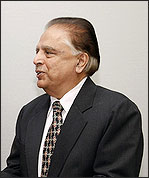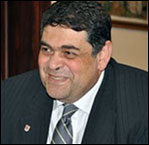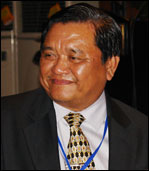
Yogyakarta Declaration as a UN Document!
The United Nations has been lending crucial support to PPD as a Permanent Observer to the UN on a number of initiatives for improvement of reproductive health, family planning and maternal health in the developing countries through South-South Cooperation. Recently the United Nations issued the “Yogyakarta Declaration” of PPD as an official document of the Commission on Population and Development and widely disseminated it in all its 6 official languages, namely English, French, Spanish, Russian, Chinese and Arabic. The Yogyakarta Declaration was adopted by the Ministers and senior government officials of 25 PPD member together with more than 250 including international experts, representatives of NGOs, Civil-society, UNFPA and WHO at the International Conference on “Promoting Family Planning and Maternal Health for Poverty Alleviation” organized by PPD and the Government of Indonesia in Yogyakarta, Indonesia on 26 and 27 October 2010.
The Declaration sets out a number of recommendations for developing countries and other partners related to major issues and concerns related to family planning, maternal health and poverty alleviation, financial and human resources required to improve family planning and maternal health, and leveraging South-South cooperation for the attainment of ICPD Goals and MDGs. Participants at the conference expressed firm commitments for implementation of the Declaration through reorientation and readjustment of their national policies and programs. PPD wishes to thank the United Nations wholeheartedly for this crucial support and looks forward to work closely with the agency for improving lives of the peoples of developing countries in the days to come.
PPD represented at the UN High level Meeting on Youth
On 25-26 July, as part of the International Year of Youth, the United Nations held a High Level Meeting on Youth at UN headquarters in New York. The meeting composed of two panel discussions and two subsequent plenary meetings discussed the challenges that youth are facing, such as unemployment and HIV, and how to overcome these. Moreover, the role played by information technology in creating a “global village” and in mobilizing youth movements for a common cause was addressed.
The meeting was opened by Joseph Deiss, President of the General Assembly, who stated that the majority of the over 1 billion young people in the world are living in developing countries. He reflected on the crucial role played by youth in the Middle East and North Africa uprisings and commended the creativity of the young, stating that often it is them who are the “more open and better innovators.”
Ban Ki-moon, Secretary-General of the United Nations, mentioned in his speech, “We live in a changing and volatile world. Only by working together in common cause can we meet our challenges. To do so, we need youth on our side — indeed in the vanguard. Young people are willing and able to take ownership of their own future and the common ideals we cherish. Let us embrace this energy, this creativity, this idealism for the benefit of all, particularly for young people.”
Babatunde Osotimehin, Executive Director of the United Nations Population Fund (UNFPA), called for budgets and decisional power to reflect the importance of youth, both in terms of numbers and as drivers of change. He stressed the importance of access to education, reproduction and sexual health services.
 Dr. S.L Rao, Permanent Observer of PPD to the UN
Dr. S.L Rao, Permanent Observer of PPD to the UN
Dr. S.L Rao the Partners in Population and Development’s (PPD) permanent observer to UN represented PPD in this high level General Assembly meeting. In his speech he strongly enunciated PPD’s believes that building national capacity to address youth development is most crucial and the international community should make all efforts to support the less developed countries in this regard. He added, “PPD is convinced that South-South and Triangular Cooperation has a significant role to play in the future in national and international efforts aimed at youth development”.
New Members on Board
 H.E Prof. Dr. Ashraf Mahmoud Ibrahim Hatem
H.E Prof. Dr. Ashraf Mahmoud Ibrahim Hatem
H.E Prof. Dr. Ashraf Mahmoud Ibrahim Hatem is the new Honorable Minister, Ministry of Health and Population Government of the Arab Republic of Egypt and member of Partners in Population and Development (PPD). PPD welcomes the Honorable Minister and wishes him the very best of success in his new position.
Member Country News:
Bangladesh launches new low dose contraceptive pill
Bangladesh is a country where “reproductive revolution” is occurring since the country gained its independence in 1971. The contraceptive prevalence rate in Bangladesh increased from 3 percent in 1971 to 55.8 in 2006 (source: Bangladesh Health Survey 2007). Oral pill is a widely used method of contraception in Bangladesh.
Recently, a nonprofit organization Social Marketing Company (SMC) has started marketing and distribution of a new low dose oral pill “Combination 3(C3)” with commodity assistance from USAID. C3 is manufactured by Bayer Schering Pharma, Germany and contains the hormonal formulation of Levonorgestrel 0.15mg and Ethinylestradiol 0.03 mg. Being a low dose formulation ‘C3’ easily suits with body. Considering the low income mass population of the country, SMC has placed ‘C3’ in the market at very affordable price.
The introduction of C3 will further strengthen the National Family program of this most densely populated country. This initiative is likely to contribute to achieve CPR rate 72% by 2015.
Indonesian Breakthrough on Male contraception
Indonesian scientists in Surabaya are drying leaves, chopping them up, extracting an active chemical and making capsules which they consider as a reliable form of male contraceptive.
The plant is called Gandarusa and its medicinal qualities have been known to local people for centuries. Traditionally, its leaves have been brewed into an herbal remedy for stress, something to soothe the nerves.
Scientists of Airlangga University in Indonesia are doing research on mice and they are excited because gandarusa doesn’t alter male hormones but rather changes the chemistry on the tip of each individual spermatozoon, making them unable to pierce the outer wall of a female egg, or oocyte. They are now undergoing testing in human beings. There’s growing confidence that this is a cheap, easy-to-make, over the counter daily birth control pill, for men.
Dr. Sugiri Syarief, MPA PPD Board Member and Chairperson of BKKBN, Government of Indonesia says: “… Family planning is not only for women, but it is a decision made by couples, husband and wives.”
There’s one other big question about how much of a role gandarusa will play in lowering that fertility rate: whether or not it gets the approval of Islamic religious leaders. But Dr. Sugiri says most mainstream imams approve of family planning methods if they are not permanent and do not harm the body. He is optimistic gandarusa will be available in Indonesian stores as early as next year.
Seminar on Mother and Children Health Care Promotion for French-speaking African Countries
The Seminar on Mother and Children Health Care Promotion for French-speaking African Countries was organized by PPD China from 10th to 28th July, 2011, sponsored by MOFCOM and NPFPC. This seminar brought all together 29 participants from 12 French-speaking African countries which included 3 PPD members of Benin, South Africa and Mali.
This three-week seminar was the first foreign aid training program for French-speaking African countries’ capacity building in the field of population and development. It composed of lectures, field visits, experience sharing sessions and cultural events. Participants also visited local family planning service centers, maternal and child service centers and health care institutions for observation study. This seminar contributed to improve African countries’ capacity in policy making, programme management and technical services. During the seminar, a joint declaration was adopted by all participants, seeking to strengthen policy dialogue and technical cooperation through building a new network among these 12 participating countries.

